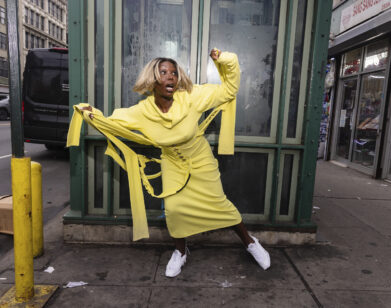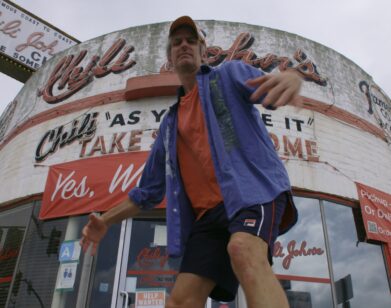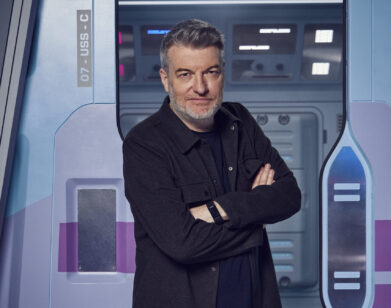SUCCESS
Jason Schwartzman and Kieran Culkin Geek Out on the Succession Extended Universe
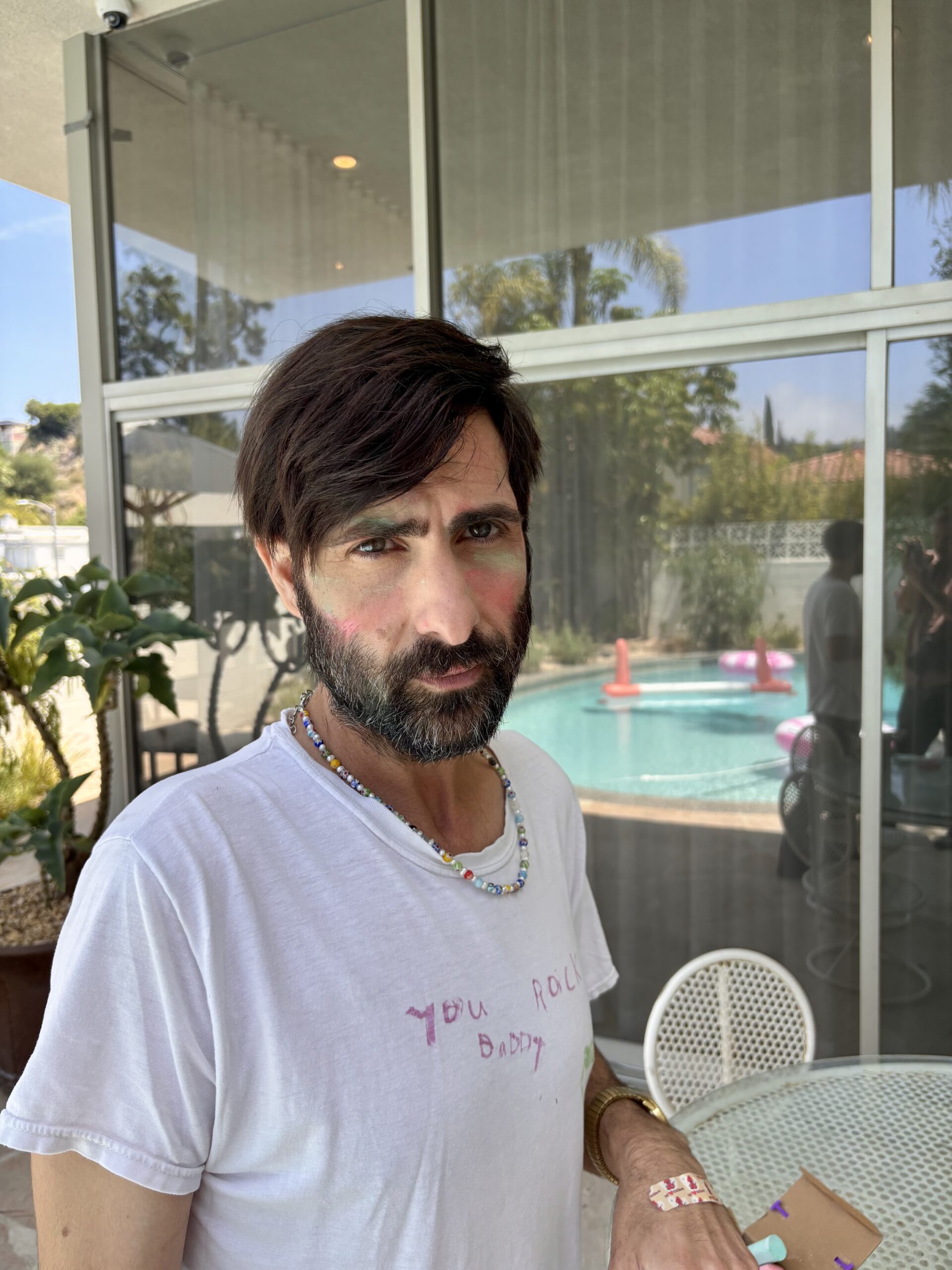
Among the many actors who made guest appearances during Succession‘s four-season run, it wouldn’t have been a stretch to picture Jason Schwartzman showing up as a neurotic tech mogul, hiding his insecurities behind his riches. So when the 44-year-old turns up as a version of that guy in Mountainhead—Succession creator Jesse Armstrong’s new HBO movie—it feels less like a surprise than an inevitability. Shot and released in a matter of months, the film stars Schwartzman alongside Steve Carell, Ramy Youssef, and Cory Michael Smith as a quartet of uber-rich dipshits holed up at a mountainside retreat while the world unravels. For Schwartzman, working with Armstrong and his band of outsiders was an entirely new, radical experience, one that Kieran Culkin knows a thing or two about.
———
KIERAN CULKIN: Hey, Jason.
JASON SCHWARTZMAN: Hi!
CULKIN: Your texts were fucking hilarious, apologizing for this and saying I could back out.
SCHWARTZMAN: I was like, oh Jesus.
CULKIN: It’s cool, I love doing this. It’s an excuse to chat with you about stuff I’d like to talk to you about anyway.
SCHWARTZMAN: Oh good. Where are you?
CULKIN: I’m in New York. Pardon my appearance, I just woke up from a ten-minute nap.
SCHWARTZMAN: Oh, good.
CULKIN: Yeah, not really. I ate something that isn’t sitting well, so I had to lie down. I’m a little worried I’m at the beginning stages of food poisoning.
SCHWARTZMAN: If you need to, at any point—
CULKIN: Hurl, vomit, and come back? Yeah, I’ll do that.
SCHWARTZMAN: I just had food poisoning recently.
CULKIN: I haven’t in years. The last time was when I was on Broadway, like 11 years ago.
SCHWARTZMAN: Oh my gosh.
CULKIN: I hated that I missed a show. That’s what I’m worried about, having to call in and say, “I’m about to miss a show.”
SCHWARTZMAN: Gosh, I would love to ask you about that, by the way.
CULKIN: Have you done theater?
SCHWARTZMAN: Never.
CULKIN: Do it.
SCHWARTZMAN: I’m dying to.
CULKIN: I think Broadway wants you to. You just have to find the right play. I literally just finished watching Mountainhead half an hour ago. It’s awesome.
SCHWARTZMAN: Maybe that’s why you were sick.
CULKIN: [Laughs] I did get really stressed, especially leading up to the attempted murder. But I tried to calm down by reminding myself, “This is Jesse. He’s not actually going to murder the person, he’s more clever than that.”
SCHWARTZMAN: By the way, I saw him yesterday evening and told him I’d be speaking with you. His face lit up. He loves you so much.
CULKIN: Oh, that’s great. He’s a dream to work with. Was he one of the major appeals of this project?
SCHWARTZMAN: Well, it all happened so quickly. I honestly didn’t think I’d get the part, I was just excited to read the script as a fan.
CULKIN: So what was the process like?
SCHWARTZMAN: It was bonkers. I was in Texas with my friend Ben Kweller, about to start making a record. It was a Thursday night, we’d rented The Matrix on his account, but it had expired, so we had to re-rent it. Right after that, I got an email: “Jesse is making a film, here are the scenes, you have to put yourself on tape by 2:00 PM tomorrow.” I thought, “Geez, we just started The Matrix, but I should probably work on this.” But I finished the movie because I wanted to see my friend’s reaction.
CULKIN: Wait. He’d never seen The Matrix?
SCHWARTZMAN: He had never seen it. I was talking to his kid, saying, “That effect, I remember when we saw that for the first time…” That’s the only movie I saw in a theater where I remember the audience cheering at the preview, when he dodges the bullet.
CULKIN: It kind of changed film, didn’t it?
SCHWARTZMAN: Yeah.
CULKIN: It’s still part of the zeitgeist. I didn’t think it would have that kind of impact at the time, but it certainly did.
SCHWARTZMAN: No, not at all.
CULKIN: And then you’re like, “I have this really important audition.”
SCHWARTZMAN: Well, I didn’t say anything until after. Basically, we transitioned from working on music to him helping me film the audition. Ben actually helped me read the scenes.
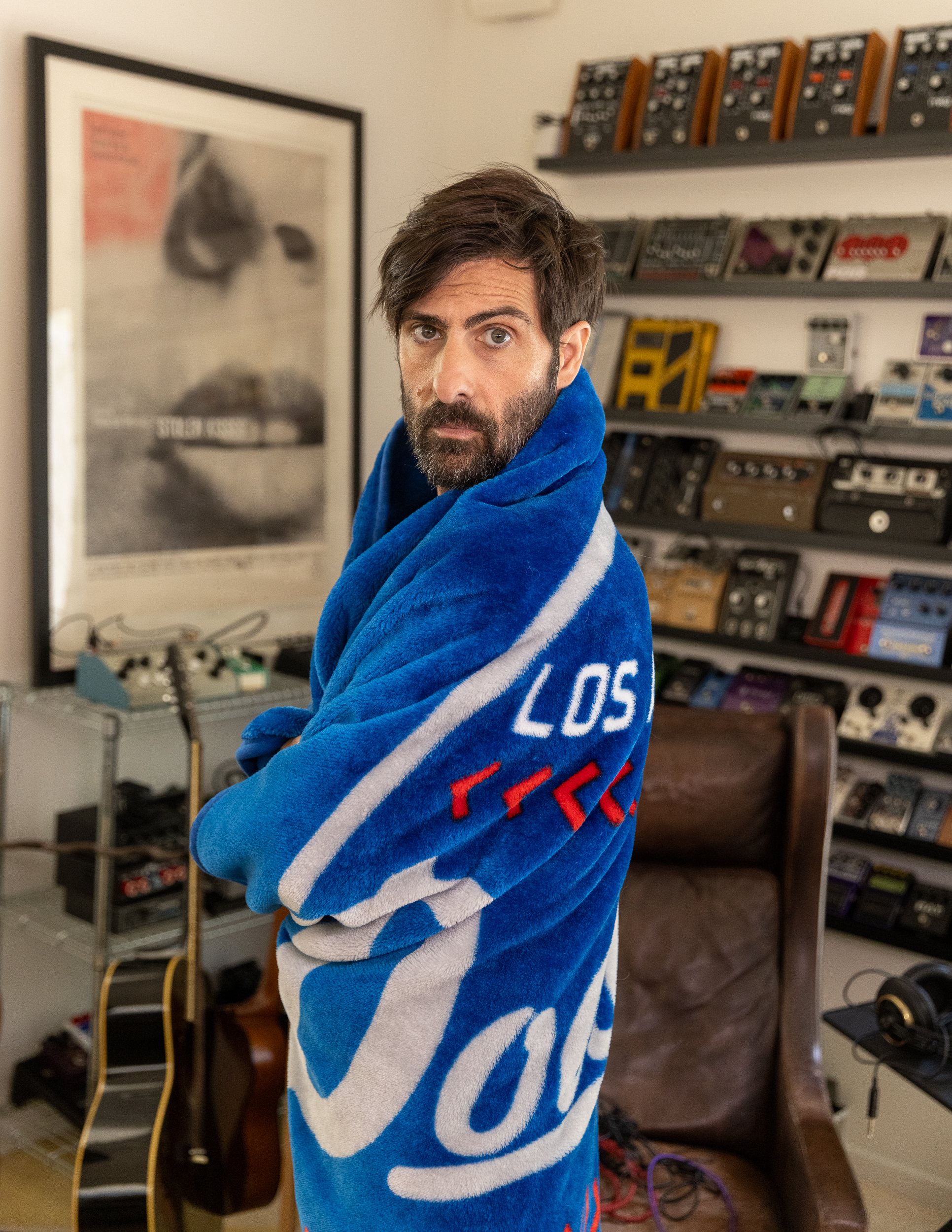
CULKIN: Oh, really?
SCHWARTZMAN: Ben was really helpful. I sent it in, and since that was in February and they started shooting March 1st or 2nd, it all happened fast.
CULKIN: And it came out at the end of May? That’s an insane turnaround.
SCHWARTZMAN: It is. But we had a lot of people from Succession.
CULKIN: They’re used to working fast. Our show moved particularly fast.
SCHWARTZMAN: It was so fun to watch them. They’re like a band.
CULKIN: Yeah.
SCHWARTZMAN: The camera and sound departments communicate in these almost musical ways.
CULKIN: Wasn’t it the camera operators, too? Did you have Gregor?
SCHWARTZMAN: Yeah, Gregor.
CULKIN: Gregor’s amazing.
SCHWARTZMAN: He is. You know how he eats mint? Pure mint, like the leaf. I was talking to Gregor, and he just reached into his pocket, took out a mint leaf, and ate it.
CULKIN: Now that you say it, that sounds familiar. I can picture it, but I don’t think I ever absorbed it the way you did. It’s a great crew, right?
SCHWARTZMAN: And they love you so much. They talk about you all the time. You’ve left such a beautiful wake behind.
CULKIN: That’s really nice. Similarly, you had that impact, too. We’ve never worked together, but were both in Scott Pilgrim [ vs. the World].
SCHWARTZMAN: Yep.
CULKIN: It was a seven-month shoot. I worked the first three months, and you worked the last month, I think. When I asked people what you were like, they said I was there for the easy part, at the beginning, when everything was exciting. I was also the only main cast member who didn’t have to learn an instrument or do fight training. So I got to just stroll in, do the acting, and fuck off home, while everyone else was there for the full seven months. Apparently, when I left, things were still at a high, but on a long shoot, especially with all the fight choreography, it gets tough. But what everyone said was that when you came, it was a breath of fresh air and brought new energy. It made everyone excited about the movie again. Edgar [Wright] said it, Michael [Cera] said it, and a lot of others in the cast did, too.
SCHWARTZMAN: That’s—
CULKIN: They were like, “When he came, he changed the tone and got us pumped about the movie.” I was excited to watch, because I got to see little bits, but never knew what you’d bring. I love you in that movie.
SCHWARTZMAN: Wow. Back at you. I could watch a whole movie about your character.
CULKIN: It’s one movie I’m in that I’ll unabashedly turn on and enjoy. Every character gets their moment.
SCHWARTZMAN: Thinking about that seven-month shoot, I wonder what it was like for Michael [Cera]. That’s a lot.
CULKIN: A huge shoot. Movies don’t take that long anymore.
SCHWARTZMAN: No, a seven-month movie shoot is crazy.
CULKIN: Yep. And you came in, did a few weeks, and got to have that nice experience.
SCHWARTZMAN: Yeah, I was there for about five weeks. It was fun to do that fight. I actually got—actually, nevermind, side note.
CULKIN: Sidebar?
SCHWARTZMAN: I got married. I had planned my wedding, not knowing I’d be working at the same time. I was doing the fight scene, which took three weeks, so I was able to leave in the middle of it, got married, and came right back.
CULKIN: [Laughs] Really?
SCHWARTZMAN: I left for two days. I hope it was seamless. I can tell, like, “That’s a married guy fighting now,” but I’m not sure anyone else would notice.
CULKIN: How? What’s the difference you saw?
SCHWARTZMAN: I just know. When I watch it, I know that’s me, post-wedding.
CULKIN: Did you gain 20 pounds right after marriage?
SCHWARTZMAN: Maybe it’s strength, or just a new kind of pressure on my shoulders. and my daughter loves you in that movie.
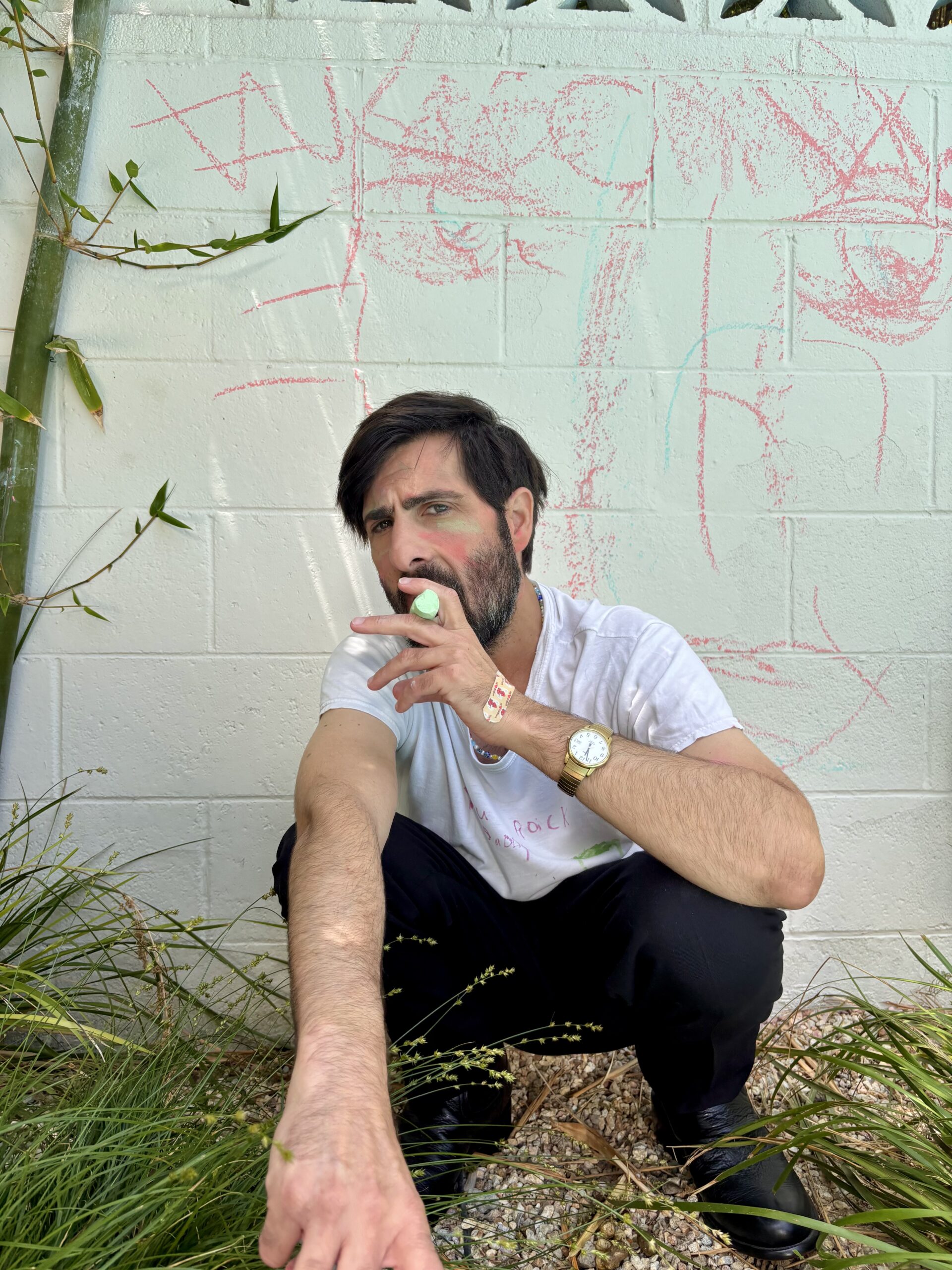
CULKIN: Oh, that’s cool. Is it cool that your kids are old enough to understand what you do for a living and watch your stuff?
SCHWARTZMAN: I mean, they don’t really know what the hell’s going on.
CULKIN: It’s funny. Before I had kids, I remember saying, “I just want to do work that my future kids will be proud of.” And somebody said, “Your kids aren’t going to care what you do.”
SCHWARTZMAN: Right.
CULKIN: I was like, “Oh, that’s kind of true.” Kids are barely curious about their parents in the first place, and if your parent is an actor, you don’t want to watch their stuff.
SCHWARTZMAN: How old are your children?
CULKIN: Three and five. I got wee ones. My five-year-old barely grasps what I do, but she kind of gets it. I’m curious if it changes when they get older.
SCHWARTZMAN: Honestly, I’m not like, “Do you have a minute to come?”
CULKIN: “Here, come watch dad’s work.”
SCHWARTZMAN: Yeah. But that was an exciting moment for me. My eight-year-old, watched it too. He fucking loves it. Edgar made something really special.
CULKIN: Yeah, he did. You shot Mountainhead all in one location. Did you guys stay in that house?
SCHWARTZMAN: I wanted to! There were a lot of rooms, but they said it would be a problem. It was a crazy house. It’s like a character in the movie. When I saw photos before we went, I realized it had to be. Apparently, it took 42,000 trucks of dirt to burrow it into the mountain. There’s a spiral staircase that goes down seven floors.
CULKIN: Yeah, I saw that.
SCHWARTZMAN: I’ve never been in a structure like that. In the beginning, it felt fake, just glass everywhere, but it’s funny how quickly it became like home.
CULKIN: Wow. And it’s just someone’s house, right?
SCHWARTZMAN: Yeah.
CULKIN: Someone decided to build a house in an impossible place.
SCHWARTZMAN: Yes. And the one day the owners came to set to watch was the day the other guys were making fun of the house. I felt terrible. Everyone was joking, “What a real shitty place this is.”
CULKIN: We asked for permission to use your house just so we could mock it.
SCHWARTZMAN: I mean, that was my concern. But overall, it was fun going to the same place every day.
CULKIN: Jesse’s dialogue is amazing, but I assume Tony was on set, and Lucy Prebble, Jon, and Will?
SCHWARTZMAN: Yes.
CULKIN: Were they throwing lots of alt lines at you?
SCHWARTZMAN: Yeah, you know how it works. The scenes were 14 or 15 pages long, and though I’ve never done a play, it felt like one, especially since we shot basically in order.
CULKIN: Wow.
SCHWARTZMAN: But with these scenes, I just didn’t want to let the other guys down. There’s such a rhythm to it, and I didn’t want to be the out-of-tune string.
CULKIN: I’m sure everybody feels that anxiety at the same time, and working with a crew that’s a well-oiled machine, you don’t want to fuck up their rhythm either.
SCHWARTZMAN: It was so intimidating. I was pretty freaked out, but your work in Succession was so inspiring. It showed me what’s possible.
CULKIN: I remember when new people came onto our show, even by season two or three, they’d seen it on TV and suddenly they’re on set. It must be weird. I always felt it was my responsibility to reassure new actors, “You’re not a fish out of water, we’re all like this. Just go with the flow, keep up, and trust the process.”
SCHWARTZMAN: Was that always the feeling?
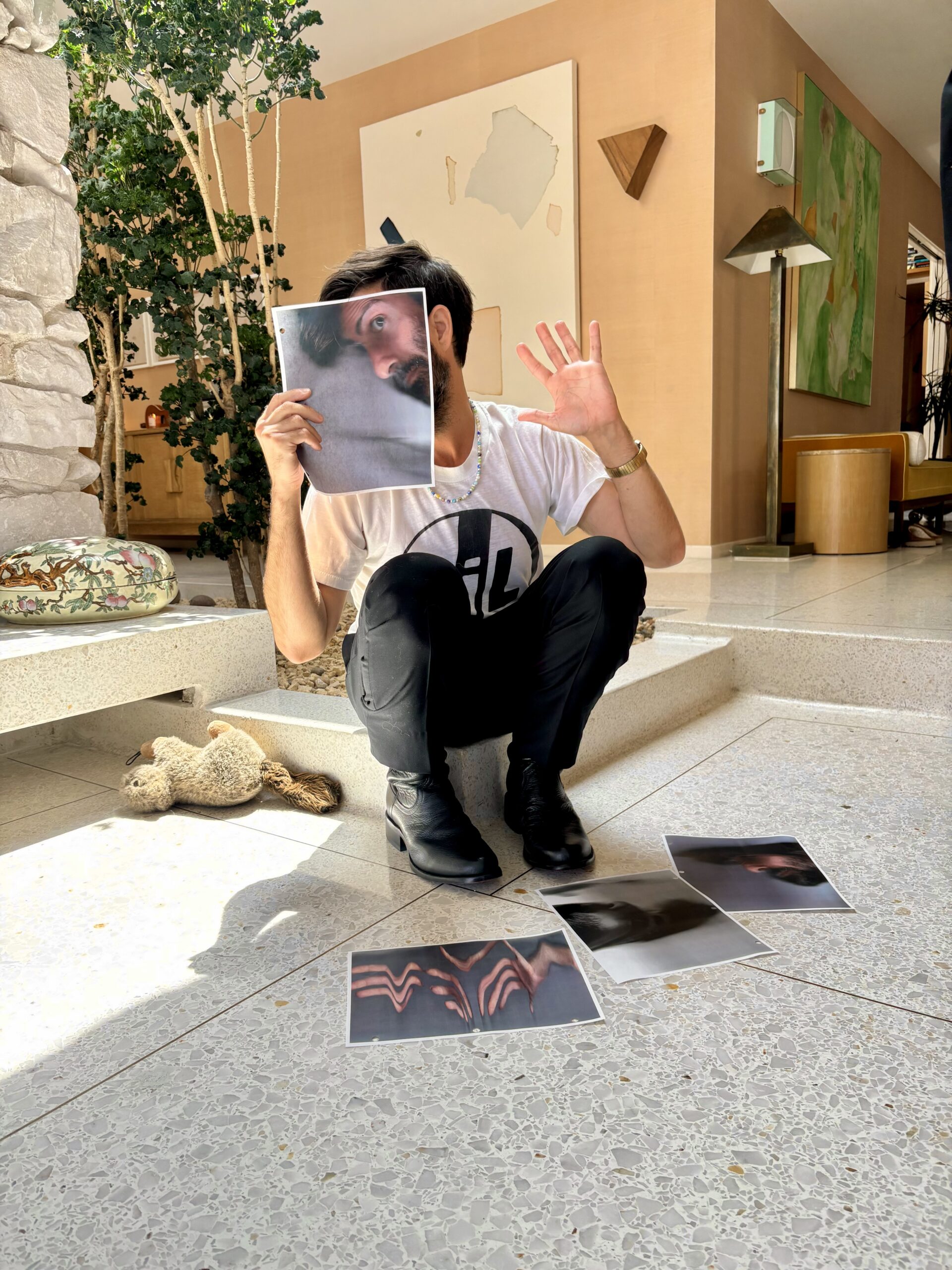
CULKIN: Yeah, “We’ll figure it out.” I’d show up not knowing what we were shooting because it would change anyway, so I stopped prepping and just trusted I could show up and they’ve got my back. The actors, the crew. If I fucked up, it was okay. Just keep moving forward.
SCHWARTZMAN: Yeah.
CULKIN: And the scene was going to happen because it was brilliantly written, we’re all working hard, and everyone knew what they were doing. Jesse would come up and give writing notes to me, but as a director, would he give very specific notes to actors, or did he just let you do your thing?
SCHWARTZMAN: A little of both. He would give specific notes, but it was interesting—sometimes he’d suggest something and it would be just a small adjustment, but it made all the difference. But I constantly felt like I was letting him down. He’s so English and smart. I did have a few times where he’d give me a note and I’d have to Google the word he used. He’d say, “I think he’s a bit perivascular,” and I’d be like, “Oh, yeah,” and then walk away to look it up. He definitely inspired me to expand my vocabulary. I have like five words I realized I use, like wild, awesome, great, scared.
CULKIN: [Laughs]
SCHWARTZMAN: I love Jon Brown, too. They’re all wonderful, and all English. Not to stereotype, but I always feel like I’m talking to someone in a band, and I love it. They’ll say, “Do you want to try this idea?” and I’m like, “Yeah, what time’s your sound check?” I’m just happy to be around them. I’m like, “What’s Liam Gallagher like?” and they’ll say, “I don’t even know.” I just love it.
CULKIN: [Laughs] Jon Brown always seems like he’s in a band. He’s always twirling that top part of his hair when you ask him a question.
SCHWARTZMAN: Did he wear Birkenstocks with socks on set?
CULKIN: Actually, I was about to mention he wore cowboy boots a lot.
SCHWARTZMAN: Son of a bitch. He switched.
CULKIN: That’s weird. Somebody pointed out with Jesse that if you ask him a question, he’ll start rubbing his head. If he gets stressed, he’ll scratch his stomach or chest. If he’s really stressed, he’ll start lifting his shirt while he does it. It’s like, “Oh, I really made him anxious, because that shirt is all the way up now.”
SCHWARTZMAN: Not to get crazy, but I watched your show twice, all the way through.
CULKIN: Oh, wow.
SCHWARTZMAN: And your work in it, not trying to be annoying, but it’s just—
CULKIN: Wild, awesome, scared?
SCHWARTZMAN: It’s pretty breathtaking, man.
CULKIN: Thanks.
SCHWARTZMAN: And now, knowing how it’s done, I think to myself, “That’s like walking on a tightrope without a net.” I’m glad it’s in the world, because if someone wants to know how it’s done, there you go.
CULKIN: That’s cool to hear.
SCHWARTZMAN: There are scenes where I just pause it and think, “How would you even think to do that?”
CULKIN: He never goes where you expect him to go.
SCHWARTZMAN: Never. And the funeral, obviously, was fucking—
CULKIN: That was a perfect example.
SCHWARTZMAN: Do you mind if I ask about that? Because I was like, “How do you do that?”
CULKIN: The way they shot it, honestly, everyone should take note. Mark Mylod directed that. He just ran a funeral procession. Before we started, he gathered all the background actors, explained what we were going to do, and had people who actually run funerals there to make it authentic. I think we had four or five cameras that day, usually we have two. What did you guys have in your movie? Two?
SCHWARTZMAN: Yeah.
CULKIN: Who was the other camera operator, do you remember?
SCHWARTZMAN: Ethan! Ethan’s great.
CULKIN: Yeah. We had Ethan for seasons three and four.
SCHWARTZMAN: He’s amazing.
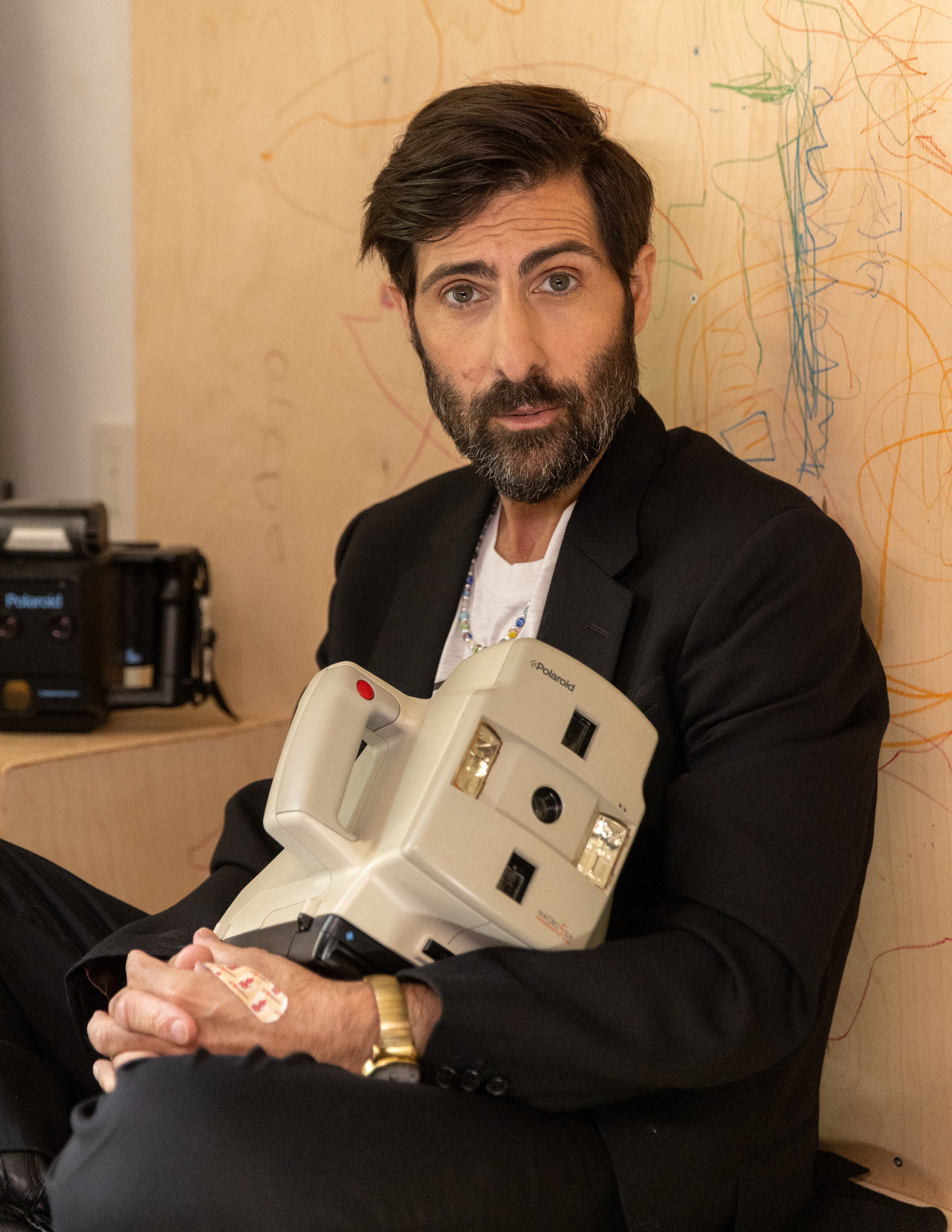
CULKIN: Yeah, he was great. For the funeral, they had the cameras set, and Mark took the podium in the church and explained the plan. We shot on film, so they planned the reloads so we wouldn’t have to stop. We ran the whole funeral procession continuously from the coffin coming out of the hearse, up the stairs, to us standing there, with cameras all around. Each person did their eulogy, some were cut, actually. We ran the entire funeral, like an hour and twenty minutes, in one take. My speech, if not all of it, was just that one take. Then we sat back down, watched the other ones and finally walked the casket out, back into the car, and it drove away. It took about thirty minutes to reset, and then we did it again. Mark just picked up a few extra bits, but that was it. We actually just did the funeral, and he made sure to cover it really well. It’s oversimplifying. But why don’t films shoot that way all the time?
SCHWARTZMAN: You need the right people. Honestly, when I first was watching that, it was amazing because you never know where things are going to go. I’m watching, thinking, “How is each person going to react? What’s going to happen?” It’s so suspenseful. I was crying, it fucked me up. It’s cool that you did it that way, because even though I’ve never done a play, my favorite thing about watching movies and plays is seeing the other people watching each other. I love the feeling that everyone is appreciating each other.
CULKIN: Everyone’s watching each other work.
SCHWARTZMAN: Yeah.
CULKIN: We didn’t do pickups. Did you?
SCHWARTZMAN: No.
CULKIN: Amazing, right? You just run the scene.
SCHWARTZMAN: Yeah, you just run the scene and watch each other.
CULKIN: There’s no such thing as coverage, which is brilliant. We’re just running the scene.
SCHWARTZMAN: Usually, they set up for two cameras, and it’s like your angle is going to work for the whole scene. But I’d never seen it where one camera is shooting, then the other shooting, and then stop shooting in the middle of a scene and moves to a new position, and starts shooting again. I remember thinking, “Whoa.”
CULKIN: Yeah. You just try not to get distracted by it.
SCHWARTZMAN: The best part is, not that you wouldn’t be present all the time, you don’t know if you’re on camera or not.
CULKIN: Yeah, exactly.
SCHWARTZMAN: That’s the best way to go.
CULKIN: It’s almost none of my business if they capture it on film or not. I’m just doing the scene.
SCHWARTZMAN: Yeah, I don’t care.
CULKIN: It’s just like, “Film it or not film it, I’m doing it.”
SCHWARTZMAN: It’s a beautiful way to work. You can get more lost in it, for sure.
CULKIN: In a good way.
SCHWARTZMAN: Yeah.
CULKIN: Quick question for you: I’m about to play your grandson, [Caesar] Flickerman [in The Hunger Games: Sunrise on the Reaping], and Francis [Lawrence, the director] told me you came up with a lot of Lucky’s [Flickerman, Schwartzman’s character in The Hunger Games: The Ballad of Songbirds and Snakes] stuff. The magician, was that completely your idea?
SCHWARTZMAN: In the book, there are a few lines that say, “He was an amateur magician.” It would just say stuff like , “He does a trick and continues on.” I thought, why not elaborate on that?
CULKIN: So in the script, that wasn’t there?
SCHWARTZMAN: Yeah, I think maybe it mentioned one thing, but I thought it would be fun to actually learn a little magic and use it as a distraction. My whole feeling was that he isn’t okay with what he’s seeing. One rule I made for myself was that whenever he comes back from any of those things, the first thing he says is never about the violence—it’s always about something else. It’s too painful for him.
CULKIN: Not that he’s removed from it, but it’s too painful to address directly. Got it. I’m nervous about it.
SCHWARTZMAN: Yeah?
CULKIN: I’m nervous because I want to do what you did with him, but that’s not usually something I’m used to. I’m used to just going in and going, “Let’s just fucking go. Let’s figure it out while we’re doing it.”
SCHWARTZMAN: That’s how it should be. You should do it your way. It’s fucking going to be great, man.
CULKIN: I hope so.
SCHWARTZMAN: It’s going to.
CULKIN: Thanks for your advice, too. I know I reached out, and you gave me a lot of your time. I appreciate it.
SCHWARTZMAN: When you texted me, as a fan of your work, I thought, “This is one of the best days ever.”
CULKIN: Oh, that’s super.
SCHWARTZMAN: It’s exciting to go, like, “I can’t wait to see that.” You know? It’s like waiting for a new record from a band you love. It’s cool when you love someone’s stuff and you’re just like, “Can’t wait to see it.” But no pressure.
CULKIN: I’m feeling the pressure.
SCHWARTZMAN: You shouldn’t. Every time I see you in something, I smile and think, “I can’t wait to see that.”
CULKIN: Yeah.
SCHWARTZMAN: I know what you mean about pressure, but Francis is all about trust.
CULKIN: He knows what he’s doing, and everyone speaks highly of him. That makes a difference.
SCHWARTZMAN: He’s a great guy. He can run a big production, but it doesn’t feel big.
CULKIN: That’s great.
SCHWARTZMAN: Man, what a pleasure. Anytime you want to talk or write, I’m around.
CULKIN: Yeah. Thanks, man. Same.
SCHWARTZMAN: All right. Good luck. You didn’t throw up.
CULKIN: No, I think I’m going to be good. I might make that show.
SCHWARTZMAN: You got it. I want to know about that later. Bye.
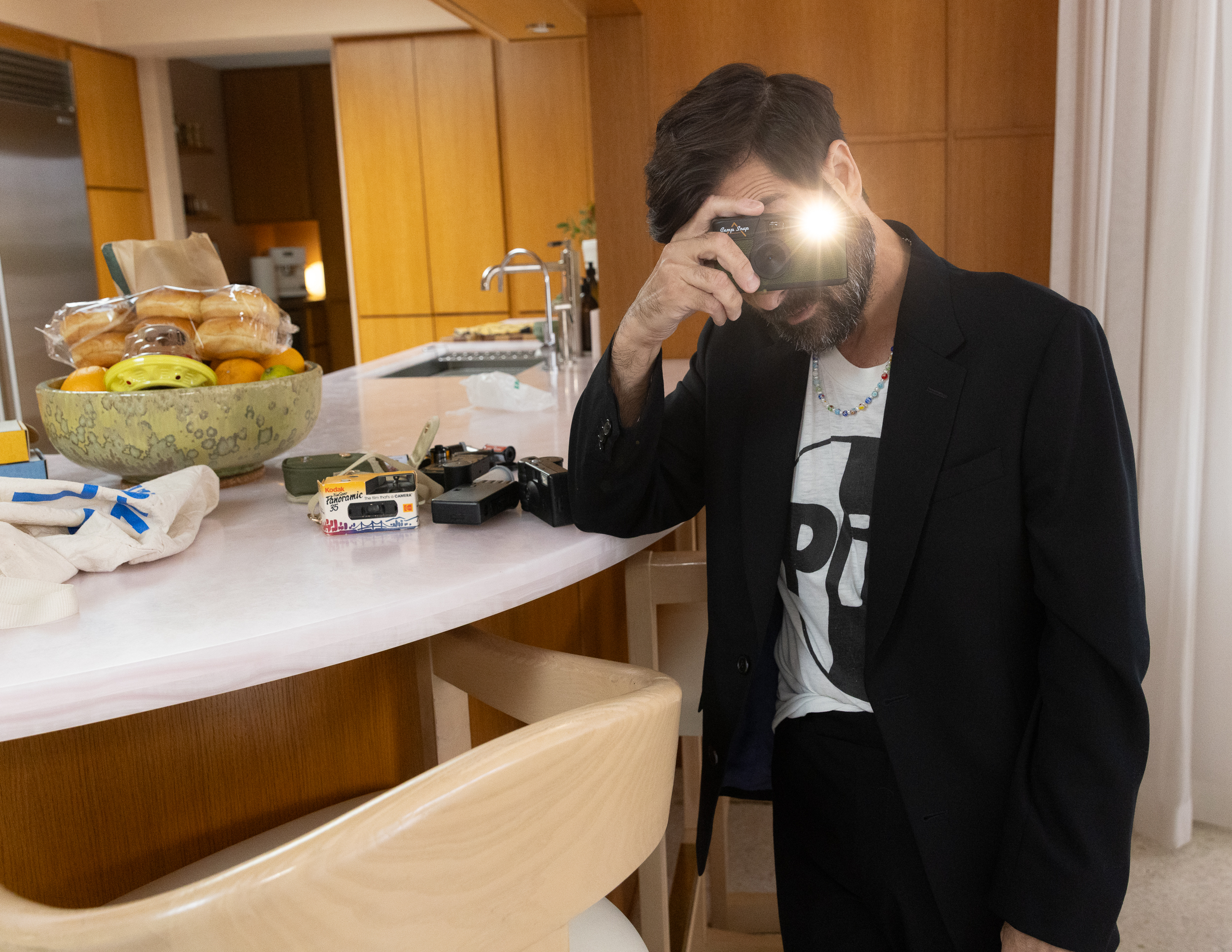
Grooming: Simone Frajnd for Exclusive Artists using Jaxon Lane and Oribe Haircare

